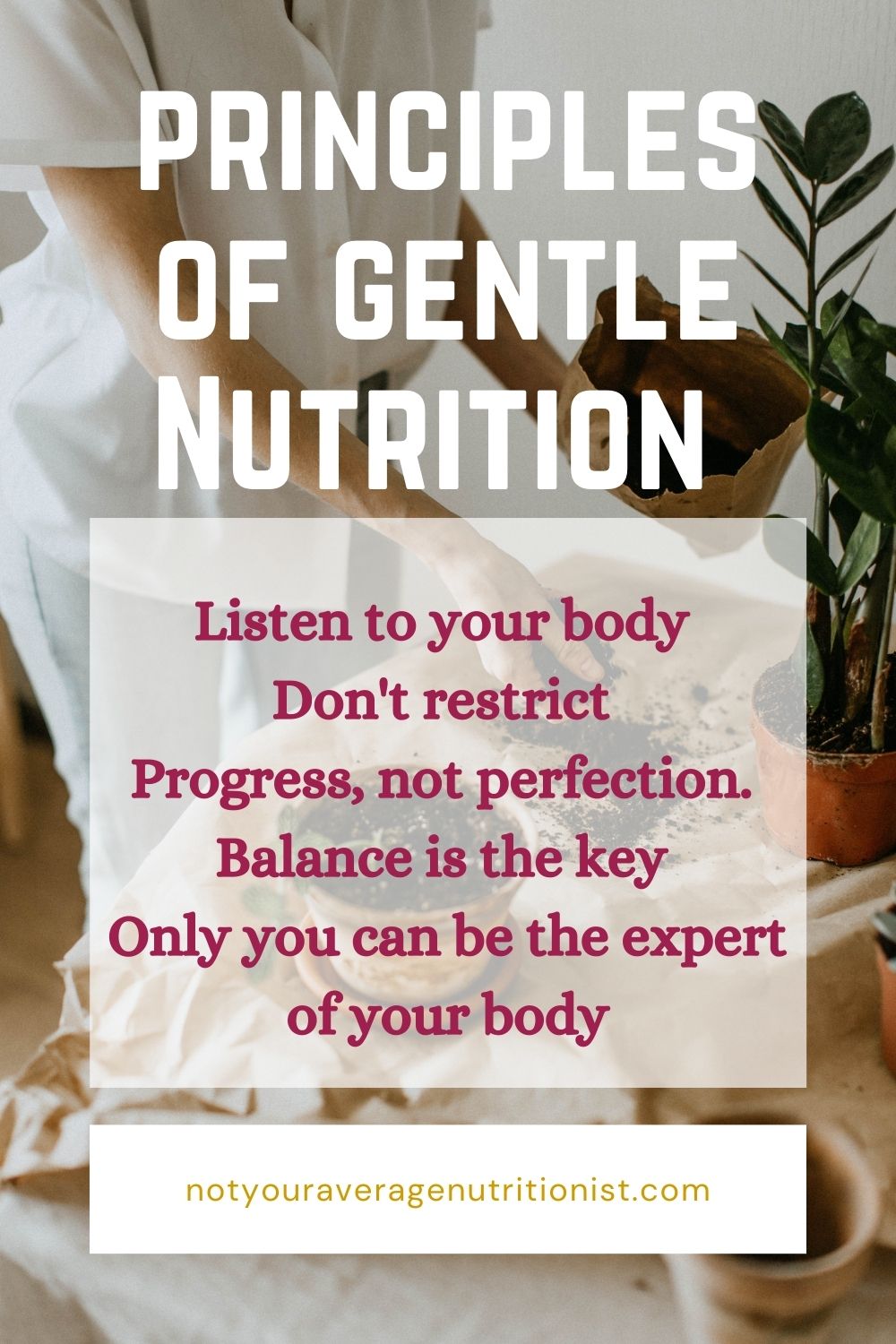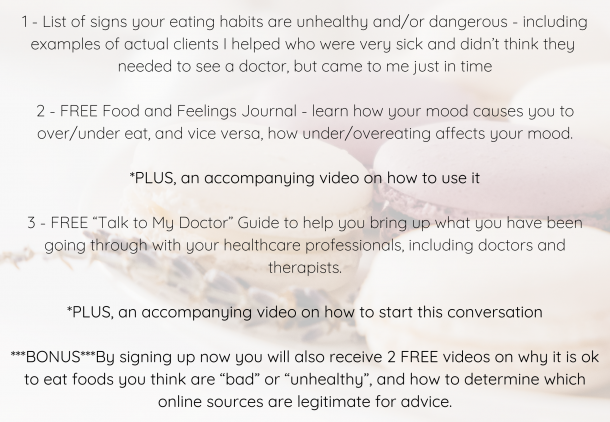- Have you ever apologized for eating a traditional meal?
- Have you ever felt guilty while eating a delicious dessert?
- Have you been stressed and worried about healthy eating?
If you answer “yes” to one of the above questions, know that you are not alone and it doesn’t need to be this way! You might want to look into the ideas of intuitive eating, including a type called gentle nutrition! This blog will show you why.
What is Gentle Nutrition?
Gentle nutrition is the last principle of intuitive eating because nutrition comes last with intuitive eating. You need to heal your relationship with food first, before you make food choices in terms of self-care and nutrition. In short, the principle of gentle nutrition states that, “Taste is important, but health is still honored, without guilt.”
Gentle nutrition encourages people to change their eating attitude: eating should be a satisfying experience, rather than making them feel guilty or bad. In essence, there is no labeled “good” or “bad” food; however, many people avoid certain “bad” foods because they think a single bite of those “bad” foods would immediately make them unhealthy. One of the key factors to this good-food/bad-food belief is the studies shown in the media. Consumers regard these findings as facts, but oftentimes they don’t realize the difference between cause and association shown in these studies, urging them to think that eating a certain food will have deleterious effects. That’s where the guilt stems from – the labels that people put on the foods that negatively influence how they feel when they take a bite.
Many people who may be influenced by diet culture tend to value the nutritional implications of food rather than the taste and enjoyability of food, thus forcing themselves to eat something considered “healthy” while still longing for another food item instead. Maybe you really enjoy the taste and texture of meat products, but you heard from the news that meats may be detrimental to our health, influencing you to feel that you need to restrict your meat consumption and eat solely vegetables. Or maybe you are passionate about desserts and baked goods, but you eliminate all those sweet foods from your plate because something is telling you that the desserts and baked goods are not “healthy”.
If any of this information resonates with you, you may want to try eating with gentle nutrition! We have some tips for you to practice this approach down below.
Why is gentle nutrition so important?
Practicing gentle nutrition reduces stress, and likely incorporates more variety than traditional dieting practices, making you overall healthier. It contributes to variety because gentle nutrition allows you to eat your favorite foods. It won’t tell you to restrict foods, but to add food groups. Eating food in diverse groups is essential to boost your health!
How can I practice Gentle Nutrition?
Listen to your body.
Reflect on how eating a particular food makes your body feel. For example, your tongue may be your first part of your body to honor when tasting foods, but it’s certainly not the only one.
Ask yourself:
- How does the food make your entire body feel? Do you like this feeling?
- Is there any discomfort in the stomach after consuming the food?
- Do you feel hungry or full after eating?
- Which foods make you feel the most and least nourished? The most and least happy?
Don’t restrict food.
The word “gentle” means that nutrition is not restrictive. Rather, it’s all about moderation, which promotes permission and versatility in consumption. Eating with moderation means to eat various types of foods in moderate amounts: not too little or too much. Consume the amount of foods that your body feels satisfied and comfortable with.
Balance is the key.
Different foods have their own nutritional values that are good for our health. For instance, we get most of our dietary fiber from fruits and vegetables. Fruits and vegetables with different colors provide different amounts of vitamins, minerals, antioxidants, and dietary fiber. Whole grains (eg. Brown rice, oats, whole wheat pasta, millet, and quinoa) provide dietary fiber, antioxidants, vitamins and minerals. Proteins such as meats, poultry, seafood, eggs, and nuts and seeds are the building blocks of our muscles, and they are also functional enzymes inside our bodies! Dairy such as low-fat or fat-free milk, yogurt and cheese provide protein, calcium, sources of vitamin D, and a variety of other nutrients. In a balanced plate, half your plate will be filled with fruits and vegetables, a quarter will be filled with protein, and another quarter with whole grains.
Progress, not perfection.
Remember, your health status is determined by your long-term dietary pattern, not just a single meal, snack, or drink. Incorporating gentle nutrition into your eating allows you to embody compassion and forgiveness with yourself. Small steps add up, and allow you to enjoy the progress/process along the way.
Only you can be the expert of your body.
No one truly understands exactly how you feel physically and mentally, except for YOU! Recognizing your body cues and understanding how you feel while eating is important for overall health. Additionally, reaching out to specialized eating disorders Registered Dietitians and Therapists are essential for your progression towards practicing gentle nutrition.
If you have more questions, please reach out to the team at Not Your Average Nutritionist for help getting your eating disorder under control.
References:




